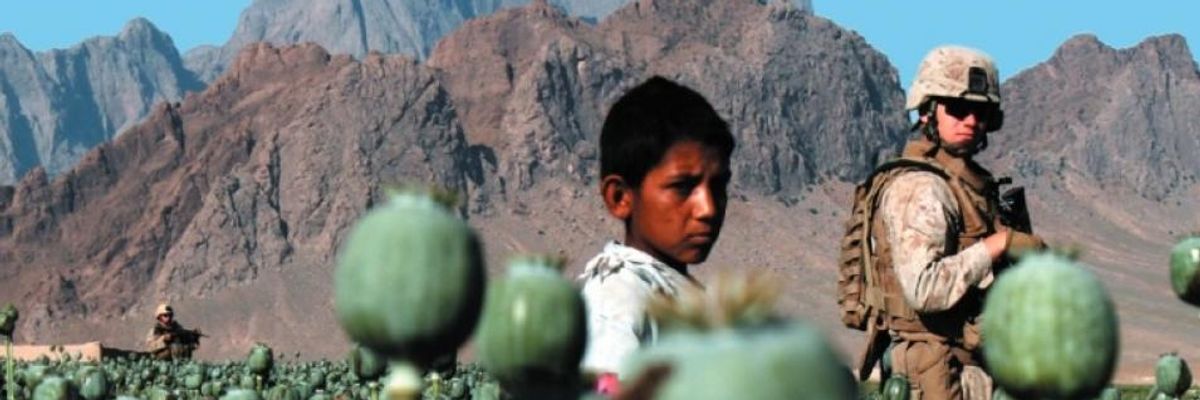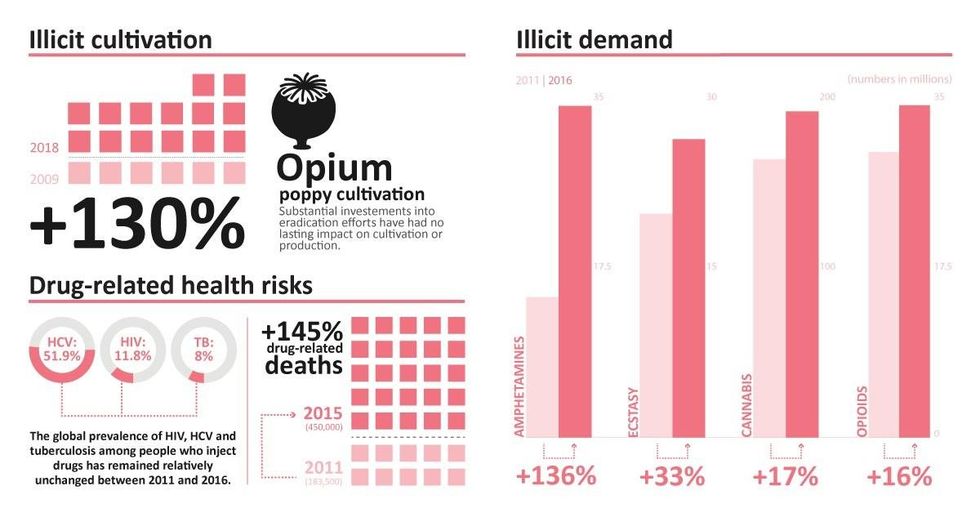

SUBSCRIBE TO OUR FREE NEWSLETTER
Daily news & progressive opinion—funded by the people, not the corporations—delivered straight to your inbox.
5
#000000
#FFFFFF
To donate by check, phone, or other method, see our More Ways to Give page.


Daily news & progressive opinion—funded by the people, not the corporations—delivered straight to your inbox.

The report--titled "Taking stock: A decade of drug policy"--evaluates the impacts of drug policies implemented across the world over the past decade, using data from the United Nations, peer-reviewed academic research, and a collection of grey literature from civil society. (Credit: Report cover / LSE)
Another major study designed to assess how national governments wage their so-called "war on drugs" shows that the last ten years of such policies have not only failed to put a dent in the illegal drug trade, the tactics have had serious negative impacts for global health, human rights, public safety and economic progress.
"This report is another nail in the coffin for the war on drugs. The fact that governments and the UN do not see fit to properly evaluate the disastrous impact of the last ten years of drug policy is depressingly unsurprising." --Ann Fordham, IDPC
As a result, the International Drug Policy Consortium (IDPC), the international group behind the report, is calling for a major rethinking of global policy on narcotics and an end to the failed efforts that governments refuse to relinquish.
"This report is another nail in the coffin for the war on drugs," said Ann Fordham, IDPC's executive director of IDPC, in a statement. "The fact that governments and the UN do not see fit to properly evaluate the disastrous impact of the last ten years of drug policy is depressingly unsurprising."
The report--titled "Taking stock: A decade of drug policy"--evaluates the impacts of drug policies implemented across the world over the past decade, using data from the United Nations, peer-reviewed academic research, and a collection of grey literature from civil society.
What did it find? It found that the last decade's efforts to eliminate the world's illicit drug market via a militarized "war on drugs" approach has had almost zero effect on global supply while creating widespread and negative effects on global health, human rights, security and development.
"Instead of reducing the overall scale of the illegal drug market," notes the executive summary (pdf), "overly punitive drug policies have often exacerbated violence, instability and corruption."
Meanwhile, over the last tens years in which decreasing crop production of opium poppy, coca, and cannabis was a key goal of governments, the report found that crop yields for all three went up. Poppy production, according the report's estimate is up by 130%, while coca production is up 34% over the last decade. Cannabis figures are harder to estimate, the report found no evidence that crops are down.

"What we learn from the IDPC shadow report is compelling. Since governments started collecting data on drugs in the 1990s, the cultivation, consumption and illegal trafficking of drugs have reached record levels," wrote Helen Clark, former Prime Minister of New Zealand and a member of the Global Commission on Drug Policy, in the report's foreword.
"Moreover," she added, "current drug policies are a serious obstacle to other social and economic objectives and the 'war on drugs' has resulted in millions of people murdered, disappeared, or internally displaced."
Trump and Musk are on an unconstitutional rampage, aiming for virtually every corner of the federal government. These two right-wing billionaires are targeting nurses, scientists, teachers, daycare providers, judges, veterans, air traffic controllers, and nuclear safety inspectors. No one is safe. The food stamps program, Social Security, Medicare, and Medicaid are next. It’s an unprecedented disaster and a five-alarm fire, but there will be a reckoning. The people did not vote for this. The American people do not want this dystopian hellscape that hides behind claims of “efficiency.” Still, in reality, it is all a giveaway to corporate interests and the libertarian dreams of far-right oligarchs like Musk. Common Dreams is playing a vital role by reporting day and night on this orgy of corruption and greed, as well as what everyday people can do to organize and fight back. As a people-powered nonprofit news outlet, we cover issues the corporate media never will, but we can only continue with our readers’ support. |
Another major study designed to assess how national governments wage their so-called "war on drugs" shows that the last ten years of such policies have not only failed to put a dent in the illegal drug trade, the tactics have had serious negative impacts for global health, human rights, public safety and economic progress.
"This report is another nail in the coffin for the war on drugs. The fact that governments and the UN do not see fit to properly evaluate the disastrous impact of the last ten years of drug policy is depressingly unsurprising." --Ann Fordham, IDPC
As a result, the International Drug Policy Consortium (IDPC), the international group behind the report, is calling for a major rethinking of global policy on narcotics and an end to the failed efforts that governments refuse to relinquish.
"This report is another nail in the coffin for the war on drugs," said Ann Fordham, IDPC's executive director of IDPC, in a statement. "The fact that governments and the UN do not see fit to properly evaluate the disastrous impact of the last ten years of drug policy is depressingly unsurprising."
The report--titled "Taking stock: A decade of drug policy"--evaluates the impacts of drug policies implemented across the world over the past decade, using data from the United Nations, peer-reviewed academic research, and a collection of grey literature from civil society.
What did it find? It found that the last decade's efforts to eliminate the world's illicit drug market via a militarized "war on drugs" approach has had almost zero effect on global supply while creating widespread and negative effects on global health, human rights, security and development.
"Instead of reducing the overall scale of the illegal drug market," notes the executive summary (pdf), "overly punitive drug policies have often exacerbated violence, instability and corruption."
Meanwhile, over the last tens years in which decreasing crop production of opium poppy, coca, and cannabis was a key goal of governments, the report found that crop yields for all three went up. Poppy production, according the report's estimate is up by 130%, while coca production is up 34% over the last decade. Cannabis figures are harder to estimate, the report found no evidence that crops are down.

"What we learn from the IDPC shadow report is compelling. Since governments started collecting data on drugs in the 1990s, the cultivation, consumption and illegal trafficking of drugs have reached record levels," wrote Helen Clark, former Prime Minister of New Zealand and a member of the Global Commission on Drug Policy, in the report's foreword.
"Moreover," she added, "current drug policies are a serious obstacle to other social and economic objectives and the 'war on drugs' has resulted in millions of people murdered, disappeared, or internally displaced."
Another major study designed to assess how national governments wage their so-called "war on drugs" shows that the last ten years of such policies have not only failed to put a dent in the illegal drug trade, the tactics have had serious negative impacts for global health, human rights, public safety and economic progress.
"This report is another nail in the coffin for the war on drugs. The fact that governments and the UN do not see fit to properly evaluate the disastrous impact of the last ten years of drug policy is depressingly unsurprising." --Ann Fordham, IDPC
As a result, the International Drug Policy Consortium (IDPC), the international group behind the report, is calling for a major rethinking of global policy on narcotics and an end to the failed efforts that governments refuse to relinquish.
"This report is another nail in the coffin for the war on drugs," said Ann Fordham, IDPC's executive director of IDPC, in a statement. "The fact that governments and the UN do not see fit to properly evaluate the disastrous impact of the last ten years of drug policy is depressingly unsurprising."
The report--titled "Taking stock: A decade of drug policy"--evaluates the impacts of drug policies implemented across the world over the past decade, using data from the United Nations, peer-reviewed academic research, and a collection of grey literature from civil society.
What did it find? It found that the last decade's efforts to eliminate the world's illicit drug market via a militarized "war on drugs" approach has had almost zero effect on global supply while creating widespread and negative effects on global health, human rights, security and development.
"Instead of reducing the overall scale of the illegal drug market," notes the executive summary (pdf), "overly punitive drug policies have often exacerbated violence, instability and corruption."
Meanwhile, over the last tens years in which decreasing crop production of opium poppy, coca, and cannabis was a key goal of governments, the report found that crop yields for all three went up. Poppy production, according the report's estimate is up by 130%, while coca production is up 34% over the last decade. Cannabis figures are harder to estimate, the report found no evidence that crops are down.

"What we learn from the IDPC shadow report is compelling. Since governments started collecting data on drugs in the 1990s, the cultivation, consumption and illegal trafficking of drugs have reached record levels," wrote Helen Clark, former Prime Minister of New Zealand and a member of the Global Commission on Drug Policy, in the report's foreword.
"Moreover," she added, "current drug policies are a serious obstacle to other social and economic objectives and the 'war on drugs' has resulted in millions of people murdered, disappeared, or internally displaced."